#taiping rebellion...........two!
Explore tagged Tumblr posts
Text
i love when the ancient apocalypse weirdos are also like 'and the bible is literally true and everything in the bible literally happened' everything? even the stuff that contradicts the chinese annals?
#.din#.txt#okay i just googled it. in fairness it is. sigh.#in fairness. noah did his thing apparently RIGHT BEFORE yu the great quelled the flood. so.#new theology: the bible is literally true its just that the other half is in china.#taiping rebellion...........two!
0 notes
Text
[Hanfu · 漢服]The relationship between women in history is not just love rivals,
“but also thousands of years later, everyone knows that it is me and you.”
Let's get to know about them/她们 in China history.
1.【Han Dynasty】:Princess Jieyou (解忧公主) & Feng Liao (馮嫽)
Princess Jieyou (Chinese: 解忧公主; 121 BC – 49 BC), born Liu Jieyou (Chinese: 刘解忧), was a Chinese princess sent to marry the leader of the Wusun kingdom as part of the Western Han Chinese policy of heqin(和亲).
As the granddaughter of the disgraced Prince Liu Wu (劉戊) who had taken part in the disastrous Rebellion of the Seven States,her status was low enough that she was sent to replace Princess Liu Xijun (劉細君) after her untimely death and marry the Wusun king Cunzhou (岑陬).
Jieyou lived among the Wusun for fifty years and did much work to foster relations between the surrounding kingdoms and the Han. She was particularly reliant upon her attendant, Feng Liao, whom she dispatched as an emissary to Wusun kingdoms and even to the Han Court. She faced opposition from pro-Xiongnu members of the Wusun royalty, particularly Wengguimi’s Xiongnu wife. When word came that the Xiongnu planned to attack Wusun, she convinced her husband to send for aid from the Han Emperor. Emperor Wu of Han sent 150,000 cavalrymen to support the Wusun forces and drive back the Xiongnu.
In 51 BCE at the age of 70, Jieyou asked to be allowed to retire and return to the Han. Emperor Xuan of Han agreed and had her escorted back to Chang'an where she was welcomed with honor. She was given a grand palace with servants usually reserved for princesses of the imperial family. In 49 BCE, Jieyou died peacefully.
Feng Liao (馮嫽)
Feng Liao (馮嫽) was China's first official female diplomat,[citation needed] who represented the Han dynasty to Wusun (烏孫), which was in the Western Regions. It was a practice for the Imperial Court to foster alliances with the northern tribes via marriage, and two Han princesses had married Wusun kings.
Feng Liao was the maidservant of Princess Jieyou (解憂公主), who was married off to a Wusun king. Feng herself later married an influential Wusun general, whose good standing with Prince Wujiutu (烏就屠) of the kingdom later proved beneficial to the Han dynasty.
When Prince Wujiutu seized the throne of Wusun in 64 BC, after his father died, there was fear in the Imperial Court of Han that Wujiutu, whose mother was Xiongnu, would allow Wusun to become Xiongnu's vassal.
Zheng Ji, Governor of the Western Regions, recalled that Feng Liao had married into Wusun and with her familiarity of the Wusun customs, she was a prime candidate to persuade Wujiutu to ally his kingdom with Han. Wujiutu acceded and Emperor Xuan of Han (漢宣帝) sent for Feng. He praised her for her judgement and diplomacy, and appointed her as the official envoy to Wusun.
Wujiutu was conferred the title "Little King of Wusun" while his brother, the son by a Han princess, was named "Great King of Wusun". Wusun was divided between the two kings and tensions in that region were eased.
※Xiongnu: Xiongnu: A nomadic tribe that has occupied northern China for a long time. Later it gradually became a state. It harassed the borders of the Han Dynasty for a long time and robbed supplies.
------
With their efforts, the Wusun Kingdom gradually tended to support the Han Dynasty, and the Xiongnu's defeat in China also began.
------
2.【Tang Dynasty】:Shangguan Wan'er(上官婉儿)&Princess Taiping (太平公主)
Shangguan Wan'er/上官婉儿 (664 – 21 July 710) was a Chinese politician, poet, and imperial consort of the Wu Zhou and Tang dynasties. Described as a "female prime minister,"Shangguan rose from modest origins as a palace servant to become secretary and leading advisor to Empress Wu Zetian of Zhou. Under Empress Wu, Shangguan exercised responsibility for drafting imperial edicts and earned approbation for her writing style. She retained her influence as consort to Wu's son and successor, Emperor Zhongzong of Tang, holding the imperial consort rank of Zhaorong (昭容). Shangguan was also highly esteemed for her talent as a poet.Shangguan was also highly esteemed for her talent as a poet. In 710, after Emperor Zhongzong's death, Shangguan was killed during a palace coup that ended the regency of Empress Dowager Wei.
Princess Taiping (太平公主)lit. "Princess of Great Peace", personal name unknown, possibly Li Lingyue (李令月) (after 662 – 2 August 713) was a royal princess and prominent political figure of the Tang dynasty and her mother Wu Zetian's Zhou dynasty. She was the youngest daughter of Wu Zetian and Emperor Gaozong and was influential during the reigns of her mother and her elder brothers Emperor Zhongzong and Emperor Ruizong (both of whom reigned twice), particularly during Emperor Ruizong's second reign, when for three years until her death, she was the real power behind the throne.
She is the most famous and influential princess of the Tang dynasty and possibly in the whole history of China thanks to her power, ability and ambition. She was involved in political difficulties and developments during the reigns of her mother and brothers. Indeed, after the coup against Empress Dowager Wei, she became the real ruler of Tang. During the reign of Emperor Ruizong, she was not restricted by anything, the emperor issued rulings based on her views and the courtiers and the military flattered her and majority from every civil and military class joined her faction, so her power exceeded that of the emperor.
Eventually, however, a rivalry developed between her and her nephew, Emperor Ruizong's son, Crown Prince Li Longji. Both of them were hostile in power-sharing and they fought for the monopoly over power. After Emperor Ruizong yielded the throne to Li Longji (as Emperor Xuanzong) in 712, the conflict came to the political forefront, and openly, the court became a manifestation of conspiracy rather than the administration of the empire; in 713, Emperor Xuanzong, according to historical records, believing that she was planning to overthrow him, acted first, executing a large number of her powerful allies and forcing her to commit suicide.
------
The relationship between Shangguan Wan'er and Princess Taiping has always been written as "enemies" in official history, but with the phrase "千年万岁,椒花颂声", their friendship that has been buried for thousands of years was revealed.
The"千年万岁,椒花颂声" sentence comes from the epitaph written by Princess Taiping for Shangguan Wan'er. The original text is: "潇湘水断,宛委山倾,珠沉圆折,玉碎连城。甫瞻松槚,静听坟茔,千年万岁,椒花颂声”
Translation: Now that you are far away, the sky and the earth will lose their color. I'm afraid that all I can do in the future is to sit and look at the tea tree in front of your tomb. Maybe I can hear your voice again when I stand within an inch of the tomb. But this is a delusion after all, a quiet tomb, no beautiful face, a empty place of death. I hope that in a thousand or ten thousand years, there will still be people like me who remember you.
------
3.【Late Qing Dynasty】:Lü Bicheng(呂碧城) & Qiu Jin (秋瑾)
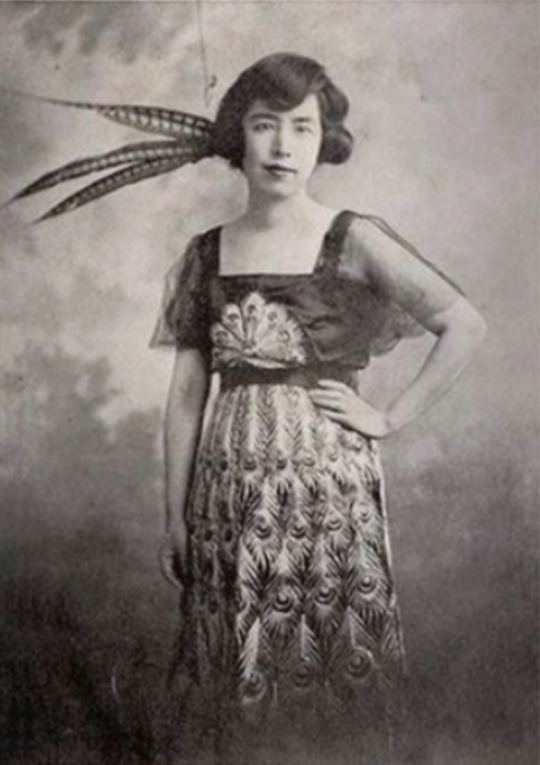
Lü Bicheng(呂碧城)also known as Alice Pichen Lee(1883–1943) was a Chinese writer, activist, newspaper editor, poet and school founder. She has been mentioned as one of the top four women in literature from the early Republic of China.
When she was four, her father retired to Lu'an, Anhui. She lived a life of comfort until the age of 12, when her father died in 1895. Because Lü Fengqi had no male heir, relatives of the Lü lineage contested for his inheritance, and Yan Shiyu and her four daughters were forced to move to Lai'an County to live with her natal family. When she was nine, Lü Bicheng was betrothed to a Wang family, but as her own family fortune declined, the Wang family broke off the marriage contract, giving the young Bicheng the stigma of a "rejected woman". The resulting emotional scar is often considered a major factor in her later decision to never marry.[8] Her widowed mother and the Lü girls were not well treated at the Yan family in rural Anhui. When Lü was 15 or 16, Yan Shiyu sent her to live with her maternal uncle Yan Langxuan (嚴朗軒), who was the salt administrator in Tanggu, the port city outside the northern metropolis of Tianjin. Her sister Huiru also joined her later.
During her stay in Tanggu, Qing China went through the tumultuous period of the failed Hundred Days' Reform of 1898, which brought about increasing awareness of women's education, and the Boxer Rebellion of 1900. In 1904, Mrs. Fang, the wife of her uncle's secretary, invited Lü Bicheng to visit a girls' school in Tianjin, but her uncle prevented her from going and severely reprimanded her. The next day, she ran away from her uncle's home, and took the train to Tianjin with no money or luggage. She wrote a letter to Mrs. Fang, who was staying at the dormitory of the Ta Kung Pao newspaper. Ying Lianzhi, the Catholic Manchu nobleman who founded the newspaper, read the letter and was so impressed by it that he made her an assistant editor. Lü Bicheng wrote a "progressive" ci that she had previously written, set to "A River Full of Red" ("Manjianghong") usually used to express heroic emotions. Ying transcribed the whole song in her diary and published it in L'impartial two days later. At the time, it was sensational for a woman to write for an influential national newspaper such as Ta Kung Pao. She was 21 years old. She used Ta Kung Pao to promote feminism and became a well-known figure.
Lü's ci poetry was published in the newspaper and it was very well received. She was the chief editor of the newspaper from 1904 to 1908. In 1904 she decided to improve education for girls. She had published her thoughts on women's rights and the general editor of the newspaper introduced her to Yan Fu who was an advocate for Western ideas. The Beiyang Women's Normal School was established that same year. At 23 Lü took on the job of principal of the school she had founded two years before. At first this school found it difficult to find girls who qualified for secondary education and students were brought in from Shanghai to make up the numbers.
Lü knew the revolutionary Qiu Jin and they had similar objectives but Lü did not join her in Japan when she was invited as she was unsure whether women should meddle in politics. She was then chosen to be secretary to Yuan Shikai, one of the most powerful people in China. When he set out to declare himself emperor of China she left, like many of his followers, and abandoned him.
--

Qiu Jin (秋瑾)8 November 1875 – 15 July 1907,was a Chinese revolutionary, feminist, and writer.Her sobriquet name is Jianhu Nüxia (Chinese: 鑑湖女俠 lit. 'Woman Knight of Mirror Lake').
Qiu was born into a wealthy family. Her grandfather worked in the Xiamen city government and was responsible for the city's defense. Zhejiang province was famous for female education, and Qiu Jin had support from her family when she was young to pursue her educational interests. Her father, Qiu Shounan, was a government official and her mother came from a distinguished literati-official family. Qiu Jin's wealthy and educated background, along with her early exposure to political ideologies were key factors in her transformation to becoming a female pioneer for the woman's liberation movement and the republican revolution in China.
In the early 1900s, Japan had started to experience western influences earlier than China. As to not fall behind, the Qing government sent many elites to learn from the Japanese. Qiu Jin was one of these elites that got the chance to study overseas. After studying in a women's school in Japan, Qiu returned to China to participate in a variety of revolutionary activities; and through her involvement with these activities, it became clear how Qiu wanted others to perceive her. Qiu called herself 'Female Knight-Errant of Jian Lake' — the role of the knight-errant, established in the Han dynasty, was a prototypically male figure known for swordsmanship, bravery, faithfulness, and self-sacrifice — and 'Vying for Heroism'
Qiu Jin had her feet bound and began writing poetry at an early age. With the support from her family, Qiu Jin also learned how to ride a horse, use a sword, and drink wine—activities that usually only men were permitted to learn at the time.In 1896 Qiu Jin got married. At the time she was only 21, which was considered late for a woman of that time. Qiu Jin's father arranged her marriage to Wang Tingchun, the youngest son of a wealthy merchant in Hunan province. Qiu Jin did not get along well with her husband, as her husband only cared about enjoying himself.While in an unhappy marriage, Qiu came into contact with new ideas. The failure of her marriage affected her decisions later on, including choosing to study in Japan.
While still in Tokyo, Qiu single-handedly edited a journal, Vernacular Journal (Baihua Bao). A number of issues were published using vernacular Chinese as a medium of revolutionary propaganda. In one issue, Qiu wrote A Respectful Proclamation to China's 200 Million Women Comrades, a manifesto within which she lamented the problems caused by bound feet and oppressive marriages. Having suffered from both ordeals herself, Qiu explained her experience in the manifesto and received an overwhelmingly sympathetic response from her readers. Also outlined in the manifesto was Qiu's belief that a better future for women lay under a Western-type government instead of the Qing government that was in power at the time. She joined forces with her cousin Xu Xilin and together they worked to unite many secret revolutionary societies to work together for the overthrow of the Qing dynasty.
Between 1905 and 1907, Qiu Jin was also writing a novel called Stones of the Jingwei Bird in traditional ballad form, a type of literature often composed by women for women audiences. The novel describes the relationship between five wealthy women who decide to flee their families and the arranged marriages awaiting them in order to study and join revolutionary activities in Tokyo. Titles for the later uncompleted chapters suggest that the women will go on to talk about “education, manufacturing, military activities, speechmaking, and direct political action, eventually overthrowing the Qing dynasty and establishing a republic” — all of which were subject matters that Qiu either participated in or advocated for.
Life after returning to China
Qiu Jin was known as an eloquent orator who spoke out for women's rights, such as the freedom to marry, freedom of education, and abolishment of the practice of foot binding. In 1906 she founded China Women's News (Zhongguo nü bao), a radical women's journal with another female poet, Xu Zihua in Shanghai. They published only two issues before it was closed by the authorities. In 1907, she became head of the Datong school in Shaoxing, ostensibly a school for sport teachers, but really intended for the military training of revolutionaries[citation needed]. While teaching in Datong school, she kept secret connection with local underground organization—The Restoration Society. This organization aimed to overthrow the Manchu government and restore Chinese rule.
Death
In 1907, Xu Xilin, Qiu’s friend and the Datong school’s co-founder was executed for attempting to assassinate his Manchu superior. In the same year, the authorities arrested Qiu at the school for girls where she was the principal. She was tortured but refused to admit her involvement in the plot. Instead the authorities used her own writings as incrimination against her and, a few days later, she was publicly beheaded in her home village, Shanyin, at the age of 31. Her last written words, her death poem, uses the literal meaning of her name, Autumn Gem, to lament of the failed revolution that she would never see take place:
秋風秋雨愁煞人 (Autumn wind, autumn rain — they make one die of sorrow)
After Qiu Jin was killed, no one dared to collect her body. Lu Bicheng endured her grief and took great risks to bury her friend. The guarding Qing army learned that the woman who came to collect the corpse was Lu Bicheng, who was famous in China, and they had no choice but to do anything.
Qiu Jin's death caused Lu Bicheng to lose a rare confidant in life. She wrote many poems in memory of Qiu Jin, recalling this like-minded friend.
Later, Lü Bicheng wrote "The Biography of the Revolutionary Heroine Qiu Jin" in English, which was published in newspapers in New York, Chicago and other places in the United States. It caused a great response and not only made many people in the world know about Qiu Jin's legendary story, but also published it in newspapers in New York and Chicago. It also makes people understand the darkness and corrupt social status quo of the Qing Dynasty. Lu Bicheng used a pen of her own to record her friendship with Qiu Jin, and also fulfilled her promise to Qiu Jin to respond with the "battle of words"
————————
📸Video & 🧚🏻 Model:@荷里寒 & @阿时Ashi_
🔗Weibo:https://weibo.com/3618951560/NEZZnpQRq
————————
#chinese hanfu#china history#woman power#woman in history#hanfu#hanfu accessories#hanfu_challenge#chinese traditional clothing#china#chinese#han dynasty#tang dynasty#late qing dynasty#feminism#revolution#漢服#汉服#中華風#girl power#hanfu girl
383 notes
·
View notes
Text

Women warriors in Chinese history - Part 2
(Part 1)
"However, court confessions, unofficial histories, and local gazetteers do reveal a host of women warriors during the Qing dynasty when patriarchal structures were supposedly most influential. Women in marginal groups were apparently not as observant of mainstream societal gender rules. Daughters and wives of “peasant rebels,” that is, autonomous or bandit stockades, were frequently skilled warriors. Miss Cai 蔡†(Ts’ai) of the Nian (Nien) “army,” for example, “fought better than a man, and she was especially fine on horseback. She was always at the front line, fighting fearlessly despite the large number of government troops.” According to a folktale, she managed to rout an invading government force of several thousand with a hundred men and one cannonball after her husband led most of the Nian off to forage for food.
Related to the female bandits were the women pirates among whom Zheng I Sao 鄭一嫂†(literally, Wife of Zheng I; 1775–1844) is the best researched. “A former prostitute … Cheng [Zheng] I Sao could truly be called the real ‘Dragon Lady’ of the South China Sea.” Consolidating her authority swiftly after the death of her husband, “she was able to win so much support that the pirates openly acclaimed her as the one person capable of holding the confederation together. As its leader she demonstrated her ability to take command by issuing orders, planning military campaigns, and proving that there were profits to be made in piracy. When the time came to dismantle the confederation, it was her negotiating skills above all that allowed her followers to cross the bridge from outlawry to officialdom.”
We know slightly more about some of the women warriors involved in sectarian revolts. Folk stories passed down orally are one of the sources. Tales that proliferated in northern Sichuan on the battle exploits of cult rebels of the White Lotus Religion uprising in Sichuan, Hunan, and Shaanxi beginning in the late eighteenth century glorify several women warriors. The tall and beautiful Big Feet Lan (Lan Dazhu 籃大足) and the smart and skillful Big Feet Xie (Xie Dazhu 謝大足) vanquished a stockade together; the young and attractive Woman He 何氏 could kill within a hundred feet by throwing daggers from horseback. The absence of bound feet in Big Feet Lan and Big Feet Xie suggests their backgrounds were either very poor, unconventional, or non-Han.
Sectarian groups accepted female membership readily, and many of these women trained in the martial arts. Qiu Ersao 邱二嫂†(ca. 1822–53), leader of a Heaven and Earth Society (Tiandihui 天地會) uprising in Guangxi, joined the sect because of poverty and perfected herself in the martial arts. Some women came to the sects with skills. Su Sanniang 蘇三娘, rebel leader of another sect of the Heaven and Earth Society, was the daughter of a martial arts instructor. Such sectarian rebel bands are frequently regarded as bandit groups. A history of the Taiping Revolutionary Movement refers to these two cult leaders as female bandit chiefs before they joined the Taipings.
Male leaders of religious rebellions frequently married women from families skilled in acrobatic, martial, and magic arts. These women tended to be both beautiful and charismatic. Wang Lun 王倫, who rebelled in 1774 in Shandong, had an “adopted daughter in name, mistress in fact,” by the name of Wu Sanniang 烏三娘 who was one of Wang’s most powerful warriors. Originally an itinerant performer highly skilled in boxing, tightrope walking, and acrobatics, she terrified the enemy with spellbinding magic. She brought a dozen associates from her old life to the sect, and they all became fearsome warriors known as “female immortals” (xiannü 仙女); three of them, including Wu Sanniang, lived with Wang Lun as “adopted wives” (ifu 義婦). A tall, white-haired woman at least sixty years old, possibly the mother of one of these acrobat-turned women warriors, wielded one sword with ease and two almost as effortlessly. Dressed in yellow astride a horse, hair loose and flying, she was feared as much for her sorcery as for her military skills. Her presence indicates that some of the women came from female-dominated itinerant performing families. Woman Zhang 張氏and Woman Zhao 趙氏, wives of Lin Zhe 林哲, another leader of the cult, were also known for being able to brandish a pair of broadswords on horseback.
Hong Xuanjiao 洪宣嬌†(mid nineteenth century), also known as Queen Xiao (xiaohou 蕭后), wife of the West King of the Taiping Heavenly Kingdom (taiping tianguo 太平天國), was so stunningly beautiful and impressive in swordsmanship that she mesmerized the entire army during battles. The link between early immortality beliefs and shamanism also suggests that these women warrior “immortals” of sectarian cults may represent surviving relics of the female shamans who occupied high positions during high antiquity.
During the White Lotus Religion rebellion in Sichuan, Hunan, and Shaanxi beginning in 1796, five of the generals were at once leaders and wives of other leaders of the cult. They were Woman Qi née Wang (Qiwangshi 齊王氏; Wang Cong’er 王聰兒), Woman Zhang née Wang (Zhangwangshi 張王氏), Woman Xu née Li (Xulishi 徐李氏), Woman Fan née Zhang (Fanzhangshi 范張氏), and Woman Wang 王†née Li 李 (Wanglishi 王李氏). In the Heavenly Principle Religion (tianlijiao 天理教) rebellion that began in Beijing during 1713, the wife of its leader, Li Wencheng 李文成, led three invasions into the city. There was even a “Female Army” (niangzijun 娘子軍) within the Eight Trigrams (baguajiao 八卦教) uprising in Shandong during the Daoguang 道光† reign (1821–51). The female generals, Cheng Sijie 程四姐†and Yang Wujie 楊五姐, were particularly impressive when they wove among enemy forces in the style of “butterflies flitting among flowers,” wielding broadswords on horseback, their hairpins glittering in the light.
A number of female rebel leaders used religion and magic to buttress their power. Many claimed to be celestials and were leaders of sectarian cults (...). Chen Shuozhen 陳碩貞†(?–653) mobilized a peasants’ uprising by declaring that she had ascended to heaven and become an immortal. Tang Sai’er (ca.1403–20), a head of the White Lotus Religion (bailianjiao 白蓮教), designated herself as a “Buddhist Mother” (fuomu 佛母). The spellbinding old woman warrior in Wang Lun’s Clear Water Religion (qingshuijiao 清水教) sect was known to the rebel community as a reincarnation of the highest White Lotus deity, the Eternal Venerable Mother (wusheng laomu 無生老母). Wang Lun relied on her for performing magic and the rituals for calling on their supreme deity. Woman Wang née Liu (wangliushi 王劉氏), one of the numerous female leaders of the White Lotus Religion revolt, also titled herself the Eternal Venerable Mother. Wang Cong’er (1777–98), originally an itinerant entertainer, became the commander in chief of the rebel army she launched with her husband, a master in the White Lotus Religion.
Indeed, itinerant performers such as Wu Sanniang mentioned above were frequently trained in the martial arts since childhood and must have been skilled at performing magic tricks as well. Lin Hei’er 林黑兒†(?–1900), leader of Red Lanterns (hongdengzhao 紅燈照), the young women’s branch of the Boxer’s Movement (yihetuan 義和團), was also originally an itinerant entertainer (her husband was a boatman). Designating herself the Holy Mother of the Yellow Lotus (huanglian shengmu 黃蓮聖母), she taught her followers the skills of wielding swords and waving fans as well as magic to defeat their enemies. Wang Nangxian 王囊仙†(literally, Goddess Nang, 1778–97), an ethnic minority of the Miao tribe, was worshipped as a goddess by her tribesmen before she led them in revolt against the Chinese government."
Chinese shadow theatre: history, popular religion, and women warriors, Fan Pen Li Chen
#history#women in history#women warriors#warriors#warrior women#china#chinese history#asian history#historyblr#qing dynasty#19 century#18th century#Wang Cong’er#hong xuanjiao#su sanniang#qiu ersao#tang sai'er#asia#Zheng Yi Sao
197 notes
·
View notes
Note
"The repression of Gordon's sexual instincts helped to develop a flood of celibate energy which drove him into weird beliefs, eccentric activities, and a sometimes misplaced confidence in his own judgement."
https://www.britishempire.co.uk/biography/gordon.htm
Major-General Charles George Gordon CB (28 January 1833 – 26 January 1885), also known as Chinese Gordon, Gordon Pasha, and Gordon of Khartoum, was a British Army officer and administrator. He saw action in the Crimean War as an officer in the British Army. However, he made his military reputation in China, where he was placed in command of the "Ever Victorious Army", a force of Chinese soldiers led by European officers which was instrumental in putting down the Taiping Rebellion, regularly defeating much larger forces. For these accomplishments, he was given the nickname "Chinese Gordon" and honours from both the Emperor of China and the British.
A serious revolt then broke out in the Sudan, led by a Muslim religious leader and self-proclaimed Mahdi, Muhammad Ahmad. In early 1884, Gordon was sent to Khartoum with instructions to secure the evacuation of loyal soldiers and civilians and to depart with them. In defiance of those instructions, after evacuating about 2,500 civilians, he retained a smaller group of soldiers and non-military men. In the months before the fall of Khartoum, Gordon and the Mahdi corresponded; Gordon offered him the sultanate of Kordofan and the Mahdi requested Gordon to convert to Islam and join him, which Gordon declined. Besieged by the Mahdi's forces, Gordon organised a citywide defence that lasted for almost a year and gained him the admiration of the British public, but not of the government, which had wished him not to become entrenched there. Only when public pressure to act had become irresistible did the government, with reluctance, send a relief force. It arrived two days after the city had fallen and Gordon had been killed.
many such cases...
12 notes
·
View notes
Note
Themed VOR two-fer, s'il vous plait: Joan of Arc and Hong Xiuquan. Thanks in advance!
So these people are almost cheating in a sense, right? The "replacement" for Joan of Arc and Hong Xiuquan is fucking no one. If they don't exist, their social role vanishes, there is no Lady of France or Taiping Rebellion without them. VOR is a good model for people who are *given* power by a system, because you are faced with the question: do I remember them because they were uniquely good with that power? Or do I remember them simply because the system gave them the power, that anyone could have wielded? Meanwhile people like Hong Xiuquan simply made power themselves out of whole cloth, we only have heard about them because they were the miraculous people who could do that.
So I think maybe its not a great lens for them. You can still do it though if you want - on a comparative scale, Joan of Arc i'd personally give a C+? As a woman military-religious figure in 15th century France, its just so hard to get any traction on that front, to become a symbol is a huge accomplishment. But her military achievements are greatly exaggerated, she was a bit of a mascot - she would say "attack attack attack" over and over to her "fellow" commanders, and when they 'agreed' she gets the credit for divine fervor, when they didn't its forgotten about. She also has the Firefly effect going on - we only remember her because she was cancelled killed.
Hong Xiuquan is S-tier. To be that crazy, that radical, and launch that successful of a rebellion? He killed almost as many people as World War 1!! That's results, baby.
And come on: "On conquering Nanjing, Marquis Zeng Guofan exhumed Hong Xuiquan's body, had him cremated, and had his ashes blasted out of a cannon to ensure that his remains had no resting place, as eternal punishment for the uprising". This guy fucks.
29 notes
·
View notes
Text

I want to make a story with a mix of JTTW and historical events like the Opium Wars and the Taiping Rebellion but it kind of feels disrespectful making a story about deities watching their own nations get supplex in front of them by other nations. And I don’t wanna start a fire storm over making a story about two favorite interest.
8 notes
·
View notes
Photo

George W. Joy - General Gordon's Last Stand - 1893
Major-General Charles George Gordon CB (28 January 1833 – 26 January 1885), also known as Chinese Gordon, Gordon Pasha, and Gordon of Khartoum, was a British Army officer and administrator. He saw action in the Crimean War as an officer in the British Army. However, he made his military reputation in China, where he was placed in command of the "Ever Victorious Army", a force of Chinese soldiers led by European officers which was instrumental in putting down the Taiping Rebellion, regularly defeating much larger forces. For these accomplishments, he was given the nickname "Chinese Gordon" and honours from both the Emperor of China and the British.
He entered the service of the Khedive of Egypt in 1873 (with British government approval) and later became the Governor-General of the Sudan, where he did much to suppress revolts and the local slave trade. He then resigned and returned to Europe in 1880.
A serious revolt then broke out in the Sudan, led by a Muslim religious leader and self-proclaimed Mahdi, Muhammad Ahmad. In early 1884, Gordon was sent to Khartoum with instructions to secure the evacuation of loyal soldiers and civilians and to depart with them. In defiance of those instructions, after evacuating about 2,500 civilians, he retained a smaller group of soldiers and non-military men. In the months before the fall of Khartoum, Gordon and the Mahdi corresponded; Gordon offered him the sultanate of Kordofan and the Mahdi requested Gordon to convert to Islam and join him, to which Gordon declined. Gordon was besieged by the Mahdi's forces, Gordon organised a citywide defence that lasted for almost a year and gained him the admiration of the British public, but not of the government, which had wished him not to become entrenched there. Only when public pressure to act had become irresistible did the government, with reluctance, send a relief force. It arrived two days after the city had fallen and Gordon had been killed.
The manner of Gordon's death is uncertain, but it was romanticised in a popular painting by George William Joy — General Gordon's Last Stand (1893, currently in the Leeds City Art Gallery), and again in the film Khartoum (1966) with Charlton Heston as Gordon. The most popular account of Gordon's death was that he put on his ceremonial gold-braided blue uniform of the Governor-General together with the Pasha's red fez and that he went out unarmed, except with his rattan cane, to be cut down by the Ansar. This account was very popular with the British press as it contained much Christian imagery with Gordon as a Christlike figure dying passively for the sins of all humanity.
George William Joy (7 July 1844 in Dublin, Ireland – 28 October 1925 in Purbrook, Hampshire) was an Irish painter in London.
He was perhaps best known for his depiction of heroism in a painting entitled The Death of General Gordon, Khartoum, 26 January 1885 (1893; Leeds City Museum). Picturing a final moment in the very recent British history of the Siege of Khartoum, Gordon is pictured bravely facing his fate in the Governor-General's Palace, Khartoum, standing above the followers of the invading Mahdi army moments before being struck down by a spear.
59 notes
·
View notes
Text
If you're not big into martial arts, you might not have heard of sanda, originally created as CQC for Chinese soldiers. It's often decried by just about everyone as being, essentially...just MMA rather than having roots in traditional Chinese kung fu.
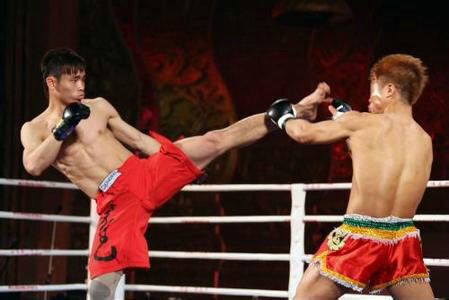
That's only half-accurate. I'll explain why, but I need to catch you up the nearly one hundred years before it's creation for context.
(CW for war crimes, brief mention of sexual assault, mention of Native American oppression, and political cartoons with a racist depictions of Asians - and as always, if someone knows better, please correct me)
The first thing you need to understand is the Century of Humiliation, a concept in Chinese historiography. The premise is that China was regularly fucked over from the 1840s to the 1940s when the communists took full control of the mainland. While this is a narrative heavily pushed by Chinese nationalism, it's not exactly wrong - they had it pretty bad, and thought not exclusively the fault of foreigners, a lot of it was, including the two Opium Wars where England and France wrecked China's shit for the right to keep the drug trade going. The Second Opium War is where the UK first got Kowloon, which would be followed later by the rest of what would become Hong Kong.
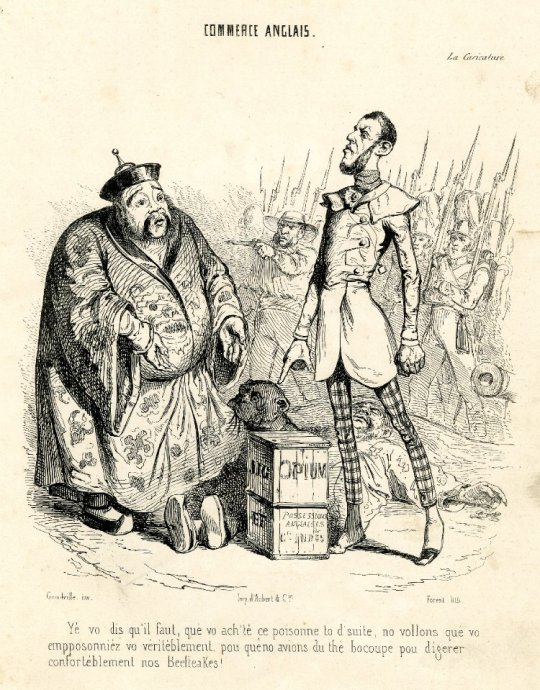
English Commerce
I tell you to immediately buy the gift here. We want you to poison yourself completely, because we need a lot of tea in order to digest our beefsteaks.
The Taiping Rebellion, from 1850 to 1864, is estimated to have cost up to about 30 million lives, compared to the American Civil War's 700 thousand. And let me tell you, it's crazy we don't talk more about the Taiping Rebellion, not only because of the devastation but because the rebels were a very strange branch of Chinese Christian that believed their leader to be the brother of Jesus Christ. Which...well, I guess that's also technically the West's fault, although Western Christians were heavily divided on how they felt about the Taiping Heavenly Kingdom, and ultimately after some indecision and putting feelers out to the rebels, the West chose to back the Qing.
For the people who love the DDR because their enforcement of laws were not always necessarily the worst in the entire world for queer folk: the Taiping Heavenly Kingdom was spectacularly feminist for it's time, way more than East Germany was pro-queer! Maybe consider switching over to Chinese Christofascism?
(I'm sorry, I'm going to be angry about that literally forever)
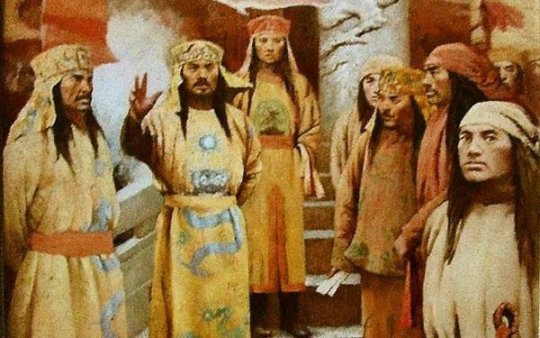
China would go on to badly lose the Sino-French War and Japanese-Sino War, the two together resulting in China losing suzerainty (essentially control of foreign affairs) over Vietnam and Korea, and a lot of their influence outside their own borders.
At this point, you can start to see how China was being treated by the West...and Imperial Japan, who, as we've discussed, were great big westaboos. Everyone wanted a piece, and it was a race to get the biggest. They didn't think in terms of what China wanted, they hardly considered themselves in opposition with China, but rather each other.
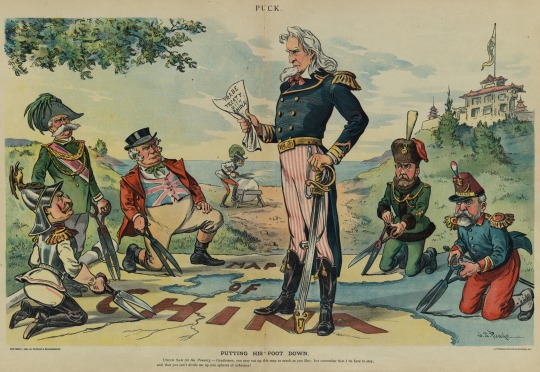
Putting His Foot Down Uncle Sam: Gentlemen, you may cut up this map as much as you like, but remember that I'm here to stay, and you can't cut me up into spheres of influence!
Needless to say, the Chinese were...not pleased with how things were going.
The traditional narrative is that the Qing's modernization efforts were, at best, a very mixed-success. There's been more questioning of that, though, since "modernization" is inherently kinna a Eurocentric term with arbitrary values. Just before the Japanese-Sino War, everyone was pretty certain "modernization" had gone great and they were going to crush Japan like ants. The Qing did face issues with corruption and firing shells that had their high-explosives siphoned to be sold off, but considering Russia has had to deal with essentially the same problem in Ukraine finding their reserve tanks to be hollow tin cans, I'd say that's fairly modern.
Social instability would continue to rapidly worsen after losing the First Sino-Japanese War, during which Japanese acts of brutality were enough, as I mentioned in my previous historical post, to elicit at least temporary scandal among the Western Powers Imperial Japan hoped so desperately to impress. Tensions were especially high with Christian missions, culminating in an incident in which two German missionaries were killed in an attempt to kill a third accused of rape. That led to Germany invading and taking away yet another piece of China's sovereign territory. Not helping things was that, because of special protections for the practice of Christianity forced on China by treaties from those prior conflicts, many bandits were "converting" or claiming to have done so in order to escape the law. And all of this is in the midst of serious natural disasters ruining lives and leaving people with nothing.
So that brings us to 1899, the main point of this post, and something you may have only heard of before in a throwaway line on Buffy the Vampire Slayer. I'm talking about the Boxer Rebellion.
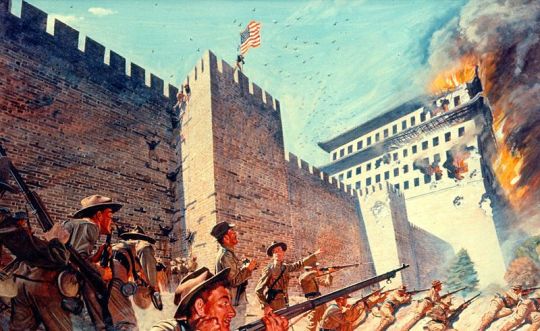
It was then that an escalating series of murders against Christians (missionaries and converts) and attacks on telegraph wires and railroads blossomed into something like but not quite a revolution, the most notable event being the Siege of Peking (Beijing), where over two thousand Christians and foreign civilians took refuge until the formation of the Eight-Nation Army, an alliance of Italy, Russia, the United States, the UK, the Austro-Hungarian Empire, Japan, Germany, and France, invaded to rescue them.
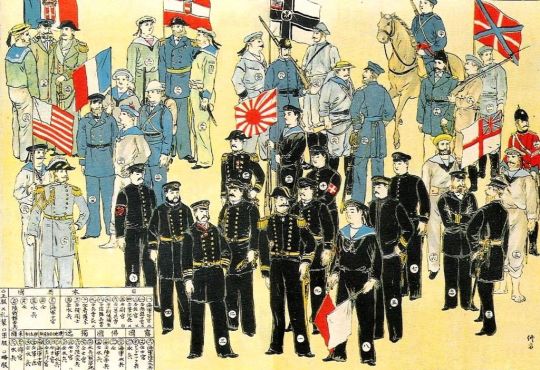
You might assume that "Boxer" came from someone's name, or a major location, or something like that, right? The name actually conceals the reason I find the Boxer Rebellion so interesting, and why we're talking about it today. See, back then, kung fu was referred to as "Chinese boxing" in the West.
The Society of Righteous and Harmonious Fists were just one extralegal organization that flourished in late 1800s thanks to the Qing slowly losing their grip on governing even within some parts of their own territory. They weren't just anti-foreigners, they started out pissed at the Qing for the ongoing troubles, and fighting government control is where they got their start. Yet, they famously used the battle cry "support the Qing, destroy foreigners" - hey, wasn't this supposed to be a rebellion by an extralegal organization?
Ha - well - while she initially condemned them, Empress Dowager Cixi would later throw in with the Fists, at least partly because the prince stanned them so hard he met with her wearing one of their uniforms. This, it seemed, was a legitimate path to expelling all foreigners.
So, right now you're probably thinking back to where this post started. The natural conclusion at this point is that the Fists surely lost, but their martial arts were impressive, right? And then that became sanda?
Well.
No.
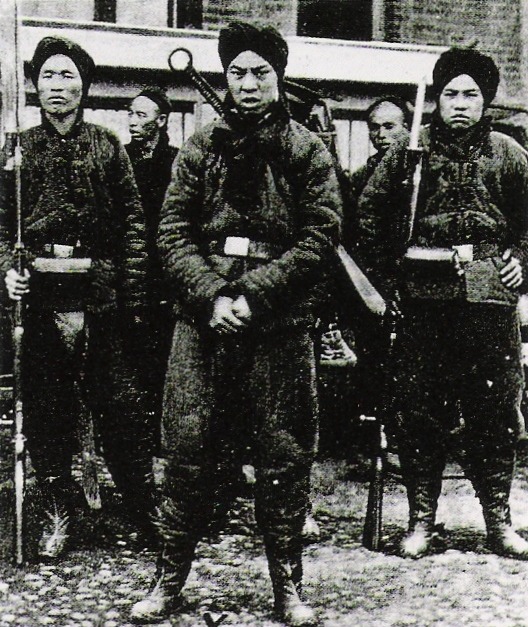
The movie Boxer Rebellion (1975) depicts martial artists jumping into crowds of armed soldiers and devastating them with the awesome power of kung fu. You might expect this to exaggeration typical of action movies, and it is, kinna. It's also only half of what the Society of the Righteous and Harmonious Fists thought they were capable of.
The Fists believed their kung fu made them invulnerable to blades and bullets, including cannonballs. They thought they could fly. They thought ghost warriors would descend from the sky to help drive out foreign armies. Though they had some firearms, they were mostly armed with blades if anything at all. The Empress ordered the Qing military to assist them, but generals wisely chose to do the bare minimum or outright ignore the command entirely.
Even stranger was the legends that grew around the Red Lanterns. You can think of the Lanterns as a kinna women's auxiliary to the Fists, who spurned women lest they "pollute" their masculine magic kung fu and cause it to fail. The Lanterns were divided by age between Black Lanterns (older women), Blue Lanterns (middle-aged women), and most famously, the Red Lanterns, who were eleven to seventeen.
Like the Fists, Red Lanterns possessed magical powers. They could fly, but also, unlike the Fists, walk on water and stop guns, among other things. When Catholic women were accused of making that masculine kung fu magic fail by exposing themselves, the Fists resolved to wait for the Red Lanterns to arrive, since their magic would be immune to corrupting femininity.
I want to take a moment to say I know how all this sounds, and I've tried to keep my language serious at least in this section because I don't mean to paint the Fists as "stupid" for the things they believed. It's important to keep in mind the Fists were largely peasants driven by nationalistic fervor and desperation from how bad things had gotten thanks to foreigners, natural disasters, and the Qing's own corruption and internal failures. It's depressingly reminiscent of ghost shirts, which just ten years prior had failed to stop bullets during Wounded Knee. The population was despondent and angry, with little still left to lose. That led them to kill innocent people prior to dying themselves to an enemy they never had a chance against. People like Mark Twain, Leo Tolstoy, and others outright took the Fists' side at least in terms of "who started it".
More often than not, history is sad.
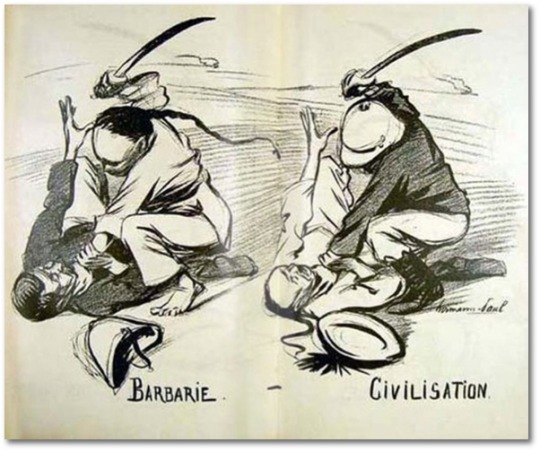
So the Boxers lost, badly. Empress Dowager Cixi was given a pass for siding with them because she was more useful on the throne than off it, but the Qing would fall about a decade later in the middle of trying once again to further "modernize". China fell a free-for-all between warlords, ultimately coming down to the Kuomintang's Republic of China and the Chinese Communist Party. The two would (barely) work together to resist Japan during the Second Sino-Japanese War, which quickly became part of World War II. Soon after they fell back into conflict, with the Kuomintang forced to retreat to Taiwan and still claims independence that the PRC still denies.
In Taiwan is the Republic of China Military Academy, which was known as the Whampoa Military Academy when it developed sanda in the mid-20s. It is, basically, MMA. Traditional martial artists certainly played a part in it's early history, but they were doing what Bruce Lee would fiercely advocate for decades later - "absorb what is useful, discard what is not". Foreign combat sports, like Muay Thai and (actual, Western) boxing were worked in as well. Like in MMA, a background in traditional martial arts can be helpful going in, but you're going to have to learn a lot more and probably unlearn several things as well. The biggest influence was actually the lei tai, raised platforms where Chinese brawlers engaged brutal and often fatal matches, sometimes with weapons even. Like, people had organs come out on the lei tai, it was nuts.
The reason MMA and sanda look so similar is that that's just what comprehensive and effective fighting looks like. It's the same reason England doesn't use gyroget ammo for their guns while Germany equips their soldiers with fully automatic crossbows. In video games, which I love with all my heart, fighting styles as diverse as sumo and capoeira are presented as more or less equally balanced, with different advantages and disadvantages. That's not how it works. We solved the optimal way to hold your arms and it's not like this.
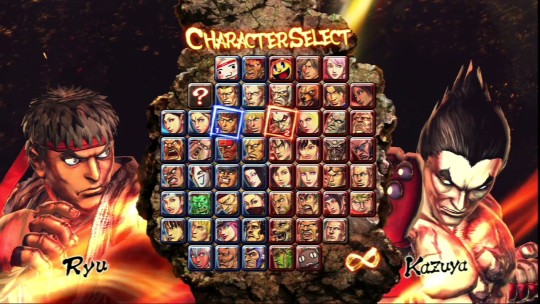
You may have heard of Xu Xiaodong, a Chinese man trained in sanda who has a history of fighting and handedly winning against supposed masters of kung fu. The PRC hates him for that because, like with pseudoscientific traditional Chinese medicine, kung fu is a useful promoter of nationalism, and it's better at that if it keeps it's mystique as impenetrable as possible.
I would probably like a lot of modern Chinese martial arts movies if not knowing that they were bankrolled to be propaganda for the PRC, like the first Ip Man, which exists to further the myth of wing chun and remind everyone that Japan sucks for what happened during WWII. I don't think they're making many movies about the Boxer Rebellion.
11 notes
·
View notes
Text
“The Holocaust was the worst mass genocide in human history!”
The Great Leap Forward, Cultural Revolution, Dungan Revolt, Taiping Rebellion, and high estimate for Holodomor—definitely Stalin’s mass murders taken as a whole—killed more people overall. Rwanda and the Holodomor (even the low estimate) killed at a greater rate. Armenian and Assyrian Genocides each killed a higher percentage of the target population, and more cruelly.
You believe the Holocaust was the worst because the entire modern international order is the work of the Allies from World War Two (two of whom, Russia and China, figure prominently above). Or, much more forgivably, because you happen to be Jewish and have fallen prey to the universal human delusion, “our problems are the worst ever”.
8 notes
·
View notes
Text
Redemption Round 2 - Match 29
Far Away is our highest seed to go to the Redemption Zone! It's here with 203 votes from Round Two, and is against Total War which had 65 votes in Round One
MAG 121 - Far Away | Spotify - Acast - YT | Wiki | Transcript
Statement of Oliver Banks, regarding his dreams and trying to run away. Statement given directly to Jonathan Sims, Head Archivist of the Magnus Institute, currently unresponsive.
MAG 105 - Total War | Spotify - Acast - YT | Wiki | Transcript
Statement of Second Lieutenant Charles Fleming, regarding his experiences during the Taiping Rebellion.
#the magnus tournament#the magnus archives#tma#mag 121#mag 121 far away#far away#oliver banks#jonathan sims#the end#end#mag 105#mag 105 total war#total war#charles fleming#the slaughter#slaughter#redemption round two
23 notes
·
View notes
Text


Name: Xifeng. Nicknames: Frosty Bitch, Alastor's Bitch, Uptight Cunt, Miss, Ma'am, Boss Lady Date of death: 1933. Cause of death: Suicide by cop to not only escape capital punishment that was waiting for her, but to avenge Alastor's death and take as many of the hunters that were on his trail down with her as well as the police officers. Age: 30's (physical appearance) Height: 5'4'' (human) | 7'5'' (demon) Birthplace: Los Angeles, California. Orientation: Demiromantic | Demisexual. Gender: Female (she/her.) Species: Demon. Occupation: Bookkeeper (human life) | Advertising executive for the Hazbin Hotel (currently) Parent(s): Unnamed mother (deceased), unnamed father (deceased.) Friends: Charlie Morningstar (business partner), Niffty (co-worker), Angel Dust, Sir Pentious, Egg Boiz (both were former enemies), Rosie, Mimzy. Enemies: Vox (by association), Exorcists: Adam, Lute. Others: Vaggie (co-worker), Husk (co-worker), Overlords (by association): Rosie, Vox, Valentino, Velvette, Zestial, Carmilla Carmine, Zeezi.
Likes: Alastor, her mother, wine, cooking, theater, dancing, jazz music, insulting others, progressivism, being in charge, making jokes, chicken. Dislikes: Her deadbeat absent father, those who talk badly about prostitution, Susan, being touched, being seen as weak, being talked down to, anyone hurting Alastor, Angel's sexual remarks, anyone threatening Alastor's interests.
History
Born to a lineage that originally immigrated from Nanjing, China to flee the Taiping Rebellion, Xifeng did not have an easy life growing up in a very racist America that discriminated against Chinese. Already denied citizenship, despite being born on American soil, this didn't leave many opportunities for Xifeng while she grew up. She couldn't attend school, so her mother had to home-school her. Because her father was frequently away to peddle his wares to whomever would buy them, this would leave her to be raised primarily by her mother, who had to sometimes turn to prostitution to provide for her daughter when money was low.
Unfortunately, tragedy would befall her family as her mother ended up being killed by someone who said she wasn't a good enough lay for them and with her father absent, it left her essentially orphaned. Deciding that she had enough of California, she decided to move to the South.
This was what she knew of life until she heard a rather enigmatic broadcast on one of the radios in one of the shops around. Since she couldn't really afford one yet, she spent plenty of time at the shops that broadcasted this particular radio show—with her becoming practically enamored with the host. Little did she know that it was Alastor himself. With his mastery over the spoken word, it helped to improve Xifeng's own English, which gave her more confidence that she might one day meet her idol.
And like a dream come true, that day would come when she swore she could hear someone speak very similar to him. And, as they say, the rest is history between the two of them. Xifeng fell heads over heels for him, even accepting and encouraging his serial killer ways due to her hybristophilia. She even lured potential targets that would make for particularly nourishing meals as well as endless entertainment for them to share.
Truly, it seemed like nothing could ever come between them, especially with how Xifeng worked as a bookkeeper for the station Alastor worked at so as to keep appearances up. He even asked her to be his wife as well, something that she didn't believe that would ever happen to her.
That is, until, Alastor would meet his untimely end by law enforcement, and with Xifeng knowing that she'd likely be put to death anyway, she took her fate into her own hands and killed herself before she'd be captured, but not before saying that she'd be seeing them in hell where they belonged. It's rumored that the sound of her dying was akin to that of hearing a bird cry.
Similarly to Alastor making headlines as a cannibalistic murderous radio host, so did she as his accomplice who lured unsuspecting victims in, and thus, her soul was dragged to Hell for her sins.
Because of her relationship with Alastor, she was able to become a powerful demon in her own right and because of Alastor's status as an Overlord, she knows that if any demon tries to mess with her, they'd only earn his ire. Though, that's not to say that Xifeng's antagonistic with all demons in hell. She gets along quite well with Rosie, Zestial, and Carmilla for instance, despite how her reputation in Hell is known for being a coldhearted bitch who doesn't care about anyone else except herself.
Known as Alastor's right hand woman, she runs an advertising agency that primarily uses newspapers, pamphlets, radio commercials, etc to get the word out with his radio show always being part of the advertisements. (VoxTek is always mysteriously absent from the newspaper advertisements and no one knows why.) She, too, has made deals with her fellow demons, especially those who are desperate to get their names out there.
However, seven years ago, she too mysteriously disappeared from Pentagram City. No one really knows why, but her advertising agency ran fine without her being at the helm, though. Yet, the true reason is because she had to recuperate after almost being killed by an Exorcist because she took a blow meant for Alastor instead that has left a nasty scar on her that causes her pain whenever the next extermination is scheduled to about to happen. No one, except Alastor himself, knows about this.
Still, she's never been one to show weakness around others. Usually wearing a smirk on her face, she continues to go about her unlife as if nothing ever happened. Like her partner, she's also extremely sadistic and manipulative and isn't above utilizing dirty tactics to get what she wants out of others. She, too, also doesn't believe that demons are capable of redemption and has no plans of redeeming herself and is just helping the hotel as its advertising agent to help further Alastor's goals.
Abilities: Eldritch magic, restorative magic, pyrokinesis, bilingualism, flight, draining one's yang essence out of them before sending them to their death, cooking, singing and dancing.
3 notes
·
View notes
Text
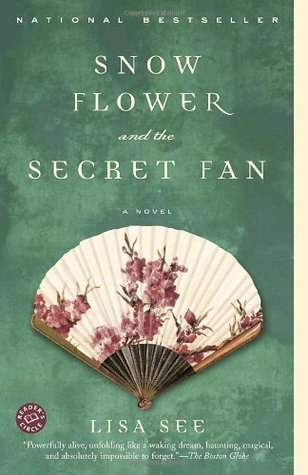
SNOW FLOWER AND THE SECRET FAN by Lisa See
RELEASE DATE: July 1, 2005
A nuanced exploration of women’s friendship and women’s writing in a remote corner of Imperial China. At the end of her life, Lady Lily Lu, the 80-year-old matriarch of Tongkou village, sits down to write her final memoir—one that will be burned at her death. Using nu shu, a secret script designed and kept by women, Lily spends her final years recounting her training as a woman, her longing for love and the central friendship of her life. Born, in 1823, into an ordinary farming family, Lily might not have ended up as a wealthy matriarch.
Her earliest memories are of running through the fields outside with her cousin Beautiful Moon in the last days before her foot-binding. But in childhood, Lily’s middle-class fate changed dramatically when the local diviner suggested that her well-formed feet made her eligible for a high-status marriage and for a special ceremonial friendship with a laotong (sworn bosom friend). Accordingly, Lily became laotong with Snow Flower, a charming girl from an upper-class household. Together, the two begin a friendship and intimate nu shu correspondence that develops with them through years of house training, marriages, childbirths and changes in social status. See (Dragon Bones, 2003, etc.) is fascinated by imagining how women with constrained existences might have found solace—and poetry—within the unexpected, little known writing form that is nu shu. Occasionally, in the midst of notes about childbirth and marriages, Lily and Snow Flower wonder how to understand the value of their secret writing in relation to the men’s “outside world.” The question is left delicately open. As the Taiping Rebellion (1851-64) approaches the villages around them, threatening to disrupt the social order, Lily and Snow Flower’s private intimacy changes, stretches and is strained. Taut and vibrant, the story offers a delicately painted view of a sequestered world and provides a richly textured account of how women might understand their own lives.
A keenly imagined journey into the women’s quarters.
3 notes
·
View notes
Text

Morse key transmitter and Morse reciever for a telegraphic line on display at the Telegraph Museum in Taiping, as well as a view of the cross-section of the undersea telegraphic cable linking the two. The telegraphic system was an essential tool in the British strategy for control and administration of the Malay States. For example, news of the killing of James W W Birch on November 2nd 1875 was telegraphed to London almost the same day and was in the London newspapers the very next morning. It is a little known-fact that just days after the murder, with Perak apparently erupting in rebellion, the submarine cable linking the Straits Settlements and Madras was suddenly broken and telegrahic communications with India and England was abruptly cut. For weeks, London found it impossible to directly coordinate military operations in Perak and either no news or very out-of-date news of how the war was proceeding. It is not known to this day what caused this mysterious collpase of the telegrahic system so soon after the Perak war erupted.
0 notes
Text

Women warriors in Chinese history - Part 1
“In the nomadic tribes of the foreign princesses from the Steppes northwest to the northeast of the Chinese borders, women habitually rode horses and were frequently also skilled militarily. They had to be able to survive on their own and defend themselves when their men left camp to herd animals for months on end. Thus, unsurprisingly, many daughters of nomadic and semi-nomadic tribal chiefs were also capable fighters. Madam Pan 潘夫人 of “barbarian origins” during the Wei dynasty, the semi-barbarian Princess Pingyang 平陽公主 who helped establish the Tang dynasty, and the “barbarian queen,” Empress Dowager Xiao, are historical examples of this category of female generals.
While the barbarians to the north were known as fan 番, those belonging to peripheral areas from the southwest to the southeast were known as man 蠻. Like the nomadic princesses, these women of non-Chinese or Chinese ethnic minority groups did not bind their feet and could thus become formidable opponents. Indeed, the female battle units within the Taiping 太平 rebel forces that actually entered combat – rather than merely providing labour as most of the female units did –were reportedly made up in the main of women from the Miao 苗 tribes, aside from the Hakka (Kejia 客家) women of Guangxi.
Female bandit leaders or daughters and sisters of bandit leaders who occupied mountains or established strongholds in marginal lands are almost indistinguishable from the man barbarian princesses of tribal chieftains in novels and shadow plays. Such barbarian women generals and female bandit leaders were rarely privileged enough to be recorded by the historians. The three found most frequently, Madam Xi 洗夫人 (502– 557), Madam Washi 瓦氏夫人 (1498–1557),95 and Madam Xu 許夫人 (1271–1368), were all pro-Chinese. While the first two cooperated with the Chinese government, the third joined Chinese forces against the Mongols. A certain Zhejie ���節 or Shejie 蛇節, a female leader of the Miao tribe, also led a rebellion against Mongol troupes, but she eventually surrendered to them and was subsequently executed.
Real enemies of the Chinese empire, such as the Trv’vy sisters of Vietnam, are hardly ever mentioned by the Chinese, even though they are first recorded in the Han dynastic history. Even under such circumstances, of the women commanders in Chinese history studied by Xiaolin Li, a hefty per cent were from “minor nationalities.”
Female rebel leaders and women warriors in rebel forces tended to rise from peasantry and marginal groups such as families of itinerant performers, robbers, boatmen, and hunters. Many of them are beautiful and charismatic. Most of the rebel groups were basically bandits (known as haohan 好漢, “bravos” euphemistically) – how else could they have survived without a continuous source of income? Many of the bandit groups, like the sworn brothers of the Water Margin, lived in mountains and marshlands, awaiting a chance to start or join in an uprising with the hope of gaining power and legitimacy through either pardon (when they posed too great a threat to the state) or founding a new dynasty. Many had sisters, wives, or daughters who were also capable of leading armies.”
Chinese shadow theatre: history, popular religion, and women warriors, Fan Pen Li Chen
#history#women in history#warrior women#women's history#historyblr#warriors#quotes#women warriors#china#chinese history#asian history#Princess Pingyang#empress dowager chengtian#lady washi#taiping rebellion#trung sisters
163 notes
·
View notes
Text
Events 7.19 (before 1940)
AD 64 – The Great Fire of Rome causes widespread devastation and rages on for six days, destroying half of the city. 484 – Leontius, Roman usurper, is crowned Eastern emperor at Tarsus (modern Turkey). He is recognized in Antioch and makes it his capital. 711 – Umayyad conquest of Hispania: Battle of Guadalete: Umayyad forces under Tariq ibn Ziyad defeat the Visigoths led by King Roderic. 939 – Battle of Simancas: King Ramiro II of León defeats the Moorish army under Caliph Abd-al-Rahman III near the city of Simancas. 998 – Arab–Byzantine wars: Battle of Apamea: Fatimids defeat a Byzantine army near Apamea. 1333 – Wars of Scottish Independence: Battle of Halidon Hill: The English win a decisive victory over the Scots. 1544 – Italian War of 1542–46: The first Siege of Boulogne begins. 1545 – The Tudor warship Mary Rose sinks off Portsmouth; in 1982 the wreck is salvaged in one of the most complex and expensive projects in the history of maritime archaeology. 1553 – The attempt to install Lady Jane Grey as Queen of England collapses after only nine days. 1588 – Anglo-Spanish War: Battle of Gravelines: The Spanish Armada is sighted in the English Channel. 1701 – Representatives of the Iroquois Confederacy sign the Nanfan Treaty, ceding a large territory north of the Ohio River to England. 1702 – Great Northern War: A numerically superior Polish-Saxon army of Augustus II the Strong, operating from an advantageous defensive position, is defeated by a Swedish army half its size under the command of King Charles XII in the Battle of Klissow. 1817 – Unsuccessful in his attempt to conquer the Kingdom of Hawaiʻi for the Russian-American Company, Georg Anton Schäffer is forced to admit defeat and leave Kauaʻi. 1821 – Coronation of George IV of the United Kingdom. 1832 – The British Medical Association is founded as the Provincial Medical and Surgical Association by Sir Charles Hastings at a meeting in the Board Room of the Worcester Infirmary. 1843 – Brunel's steamship the SS Great Britain is launched, becoming the first ocean-going craft with an iron hull and screw propeller, becoming the largest vessel afloat in the world. 1845 – Great New York City Fire of 1845: The last great fire to affect Manhattan begins early in the morning and is subdued that afternoon. The fire kills four firefighters and 26 civilians and destroys 345 buildings. 1848 – Women's rights: A two-day Women's Rights Convention opens in Seneca Falls, New York. 1863 – American Civil War: Morgan's Raid: At Buffington Island in Ohio, Confederate General John Hunt Morgan's raid into the north is mostly thwarted when a large group of his men are captured while trying to escape across the Ohio River. 1864 – Taiping Rebellion: Third Battle of Nanking: The Qing dynasty finally defeats the Taiping Heavenly Kingdom. 1870 – Franco-Prussian War: France declares war on Prussia. 1900 – The first line of the Paris Métro opens for operation. 1903 – Maurice Garin wins the first Tour de France. 1916 – World War I: Battle of Fromelles: British and Australian troops attack German trenches as part of the Battle of the Somme. 1934 – The rigid airship USS Macon surprised the USS Houston near Clipperton Island with a mail delivery for President Franklin D. Roosevelt, demonstrating its potential for tracking ships at sea. 1936 – Spanish Civil War: The CNT and UGT call a general strike in Spain – mobilizing workers' militias against the Nationalist forces.
0 notes
Text
Another of the classics is the Mahdist War, which would include two of the classic mythical moments of the British Empire:
The British Empire, once it conquered the Khedivate in 1882, committed itself to holding the Khedive's territories in what is today North and South Sudan. The limitations of this and the successes revealed both the real heft of European imperialism in the form of its modern weapons, and that no such forces were invulnerable. Muhammad ibn Ahmed, a warlord of the Sudan in a classical Islamist fashion, created new armies that collided with those of the Imperialist warlord General 'Chinese' Gordon, a figure who'd fought with the Qing to suppress the Taiping Rebellion. The result was the Siege of Khartoum and the city's fall, and the later mounting of the second war by General Kitchener against the Mahdi's son.
The Mahdi stands as one of the few Muslim rulers of Africa in this era to win a major victory against European arms in that continent, though his son was not his equal and the ways in which he was not contributed to the ultimate catastrophe at Omdurman.
#lightdancer comments on history#black history month#military history#mahdist war#islamic history#african history#imperialism in africa
0 notes